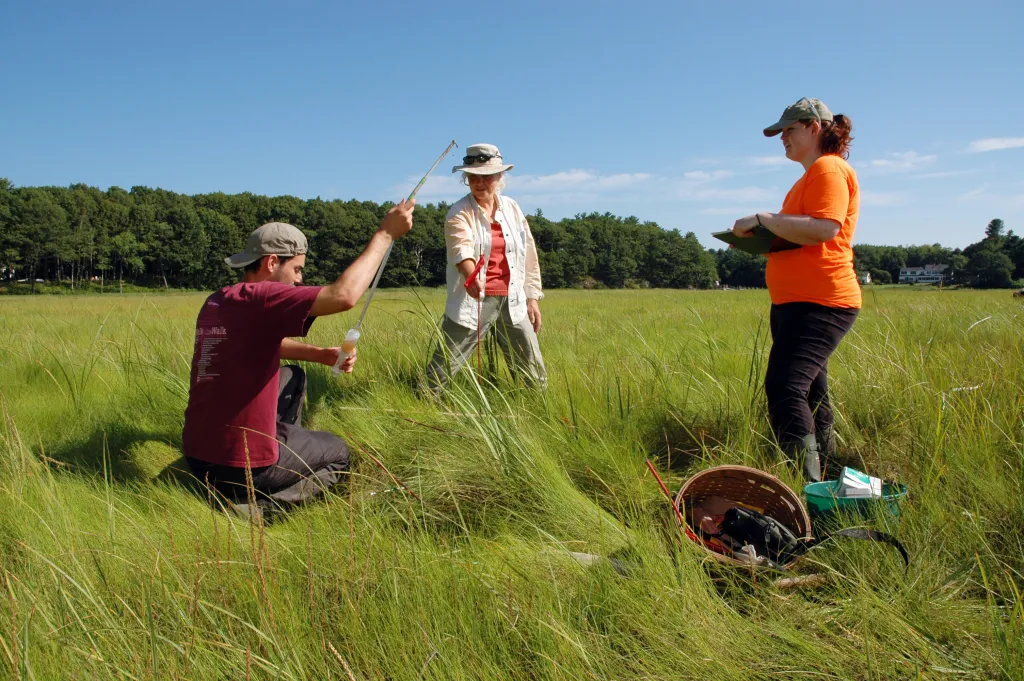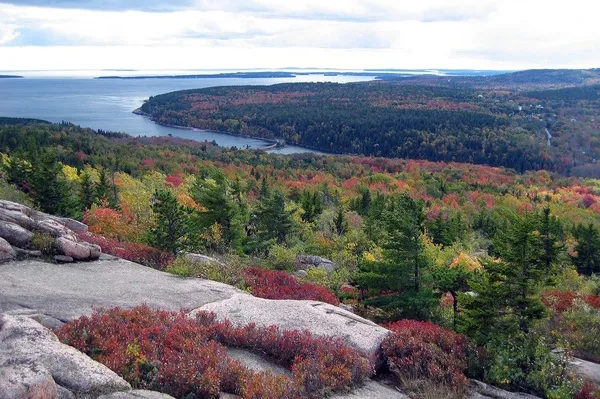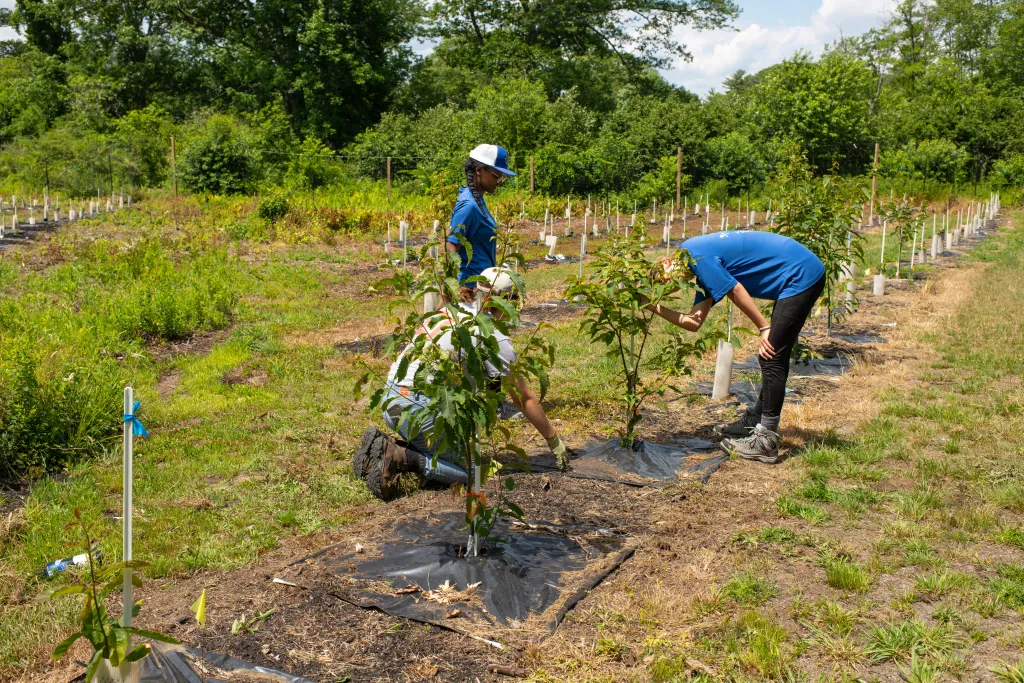
What Will You Study? Environmental Studies Degree Curriculum Overview
Since 1991, the faculty of the College of Arts and Sciences has defined environmental awareness as a major theme in the College’s Core Curriculum and asked the Environmental Studies program to deliver the course Introduction to Environmental Issues to all undergraduates regardless of major. The UNE College of Arts and Sciences is one of the few in the nation that requires formal instruction in Environmental Studies as a requirement for graduation.
Examples of Available Courses for the Environmental Studies Degree
The following are just some examples of the exciting courses that the Environmental Studies major offers:
- Sustainability and Ecological Restoration
- Environmental Communication: Expert Practices for Ecosystem Management
- Contemporary Nature Writing
- Environmental Movements and Social Change
- Environment, Health, and Community Development in East Africa
- Climate Change Adaptation: Planning and Policy
Bachelor of Science in Environmental Studies with Secondary Teaching Certification
If you are interested in becoming a middle school or high school science teacher, you may select the necessary courses in secondary education as electives and complete the teaching internship required to qualify for State of Maine certification (grades 7–12) upon graduation.
Double Majors for Environmental Studies
As an Environmental Studies major, you may opt to double major in another discipline. This popular way to enhance your career-preparedness allows you to complete both degrees in four years and prepares you for the complexity of real-world environmental challenges.
For more information including current double major requirements and course sequences, email envstudies@une.edu.
Popular Double Majors for Environmental Studies Students
This double major might be for you if your passions are the human, social and political aspects of natural resources and environmental challenges on both land and sea. This training prepares you for work in environmental policy and resource management, particularly at the land–sea interface.
This double major might be for you if your passions are related to the societal impacts of, and responses to, environmental challenges. This training prepares you for environmental work in both public and private organizations, as well as for graduate school in environmental studies or a variety of social sciences.
Bachelor of Science in Environmental Studies Curriculum
The faculty in UNE’s three (3) colleges offering undergraduate programs have defined health of natural ecosystems as a major theme in the Nor’easter Core Curriculum. As part of the Nor’easter Core, the environmental studies program within the School of Marine and Environmental Programs delivers courses like Introduction to Environmental Issues to all undergraduates regardless of major. UNE is one (1) of the few in the nation to require formal instruction in the health of natural ecosystems as a requirement for graduation.
| Nor’easter Core Requirements | Credits |
|---|---|
| Total Credits | 40 |
| Program Required Courses | Credits |
|---|---|
| BIO 105/105L – Biology I: Ecology/Evolution w/Lab | 4 – Fulfills Scientific Method Core |
| BIO 106/106L – Biology II: Cellular/Molecular w/Lab | 4 |
| BIO 350/350L – Ecology w/Field Lab | 4 |
| BUEC 104 and 105 or BUEC 106 – Economics in Context | 3 |
| ENV 100 and 101 or ENV 104 – Introduction to Environmental Issues | 3 |
| ENV 200 – Environment and Society: A Global Perspective | 3 – Fulfills Health of Natural Ecosystems Core |
| ENV 215 – Field Methods in Conservation | 3 |
| ENV 220 – Conservation and Preservation | 3 |
| ENV 240 – Environmental Sustainability Lab | 2 |
| ENV 250 – Environmental Policy in Comparative Perspective | 3 |
| ENV 499 – Senior Capstone in Environmental Studies | 3 |
| LIT 121 and 122 or LIT 124 – Literature, Nature and the Environment | 3 |
| MAT 151 – Statistics for Environmental Sciences | 3 – Fulfills Quantitative Reasoning Core |
| One (1) Chemistry Elective w/Lab | 4 |
| One (1) Environmental Science Elective* | 3–4 |
| Select one (1) course from each of the four (4) Distribution Groups in the list of Environmental Studies Distribution Requirements and additional credits chosen from any of the groups to total twenty-one (21) or more credits | 21–28 |
| Up to twelve (12) credits of ENV 295 or ENV 495 Internship courses may be arranged with special permission from the Academic Director | 3–12 |
| Total Credits | 72–86 |
| Open Elective Courses (as needed to reach 120 credits) | Variable |
| Minimum Total Required Credits | 120 |
|---|
Please note: While some courses can fulfill both core and program requirements, the credits earned do not count twice towards the minimum total required credits for the degree.
*After consulting with their academic advisors, Environmental Studies majors will choose 3-4 credit hours of an upper-division science course in Environmental Science or Biology, Marine Science, Chemistry, Physics, or Psychology. This course should be taken during the third or fourth year.
Environmental Studies Distribution Requirements List
| Group One (1): Conservation, Preservation, Restoration | Credits |
|---|---|
| ENV 309 – Sustainability and Ecological Restoration | 3 |
| ENV 312/312L – Wetland Conservation and Ecology w/Field Lab | 4 |
| ENV 313/313L – Wetland Restoration: Science and Policy w/Field Lab | 4 |
| ENV 397 – Topics in Environmental Studies | 3 |
| ENV 398 – Topics in Environmental Studies | 3 |
| ENV 399 – Topics in Environmental Studies w/Lab | 4 |
| Group Two (2): Environmental Policy and Management | Credits |
|---|---|
| BUEC 390 – Environmental Economics | 3 |
| BUEC 395 – Ecological Economics | 3 |
| ENV 321 – Environmental Communication: Expert Practices for Ecosystem Management | 3 |
| ENV 328 – Environmental Pollution: Ecosystems, Wildlife, and Human Health | 3 |
| ENV 357 – Sustaining Water: Social and Global Perspectives | 3 |
| ENV 362 – Climate Change Adaptation | 3 |
| ENV 397 – Topics in Environmental Studies | 3 |
| ENV 398 – Topics in Environmental Studies | 3 |
| ENV 399 – Topics in Environmental Studies w/Lab | 4 |
| Group Three (3): Arts, Humanities, and Values | Credits |
|---|---|
| ENV 331 – Women and the Environment | 3 |
| ENV 333/333L – The Nature Writers w/Field Lab | 4 |
| ENV 334 – Contemporary Nature Writing | 3 |
| ENV 334L – Contemporary Nature Writing Lab | 1 |
| ENV 338 – Environmental Topics in Popular Lyrics | 3 |
| ENV 397 – Topics in Environmental Studies | 3 |
| ENV 398 – Topics in Environmental Studies | 3 |
| ENV 399 – Topics in Environmental Studies w/Lab | 4 |
| Group Four (4): Global Ecology and Social Justice | Credits |
|---|---|
| ENV 340 – Environmental Movements and Social Change | 3 |
| ENV 341 – Indigenous Ecology, Conservation Biology, and the Politics of Knowledge | 3 |
| ENV 344 – Environmental Ethics | 3 |
| ENV 349 – Environment, Health, and Community Development in E. Africa | 3 |
| ENV 349L – Environment, Health, and Community Development in E. Africa Lab | 1 |
| ENV 397 – Topics in Environmental Studies | 3 |
| ENV 398 – Topics in Environmental Studies | 3 |
| ENV 399 – Topics in Environmental Studies w/Lab | 4 |
Students wishing to pursue teacher certification in Life Science can complete a double major with Environmental Science and Middle and Secondary Education or a major in Middle and Secondary Education and a concentration in Environmental Science. For more information, see the Middle and Secondary Education catalog page.
Students in this major can participate in the pre-health graduate school preparation tracks.
To learn more about the program visit the Academic Catalog.
Green Learning Community
The Green Learning Community (GLC) is an intentional community of professors and first-year students dedicated to studying human relations to the environment. The year-long experience integrates courses in biology, environmental issues, literature, and economics.
In classes, you will find the same topic presented from different perspectives. You learn about the environment in an atmosphere where your opinions are welcomed and valued by supportive professors who foster a sense of community.
Much of the learning you do through the GLC takes place outside the classroom. The community-building experiences begin early in the fall with a retreat to Bryant Pond where you explore your individual goals for learning while collaborating in outdoor activities like hiking, paddling, and working through a ropes course. Additional field trips throughout the year take you to places like the Wells National Estuarine Research Reserve, Wildlife Conservation Lands, and the Portland Trail System.
The small class sizes in the GLC allow you to receive individual attention and instruction that help develop your academic, research, and communication skills.
Restoring the American Chestnut Tree in Maine
University of New England Professor of Environmental Studies Thomas Klak, Ph.D., and his students, have joined the work to restore the iconic American chestnut tree — once one of the most important forest trees throughout North America, until the species was devastated by a blight.
Career Paths for Environmental Studies Degree Grads
With the knowledge you gain from your Environmental Studies degree coursework, the critical thinking skills you develop through research, and the life skills you acquire from internships and close working relationships with faculty and peers, you will be well on your way to an exciting career working in environmental programs.
Our graduates have pursued careers in many fascinating fields, including:
- Environmental Advocacy
- Air and Water Resource Management
- Ecological Restoration
- Education
- Habitat Conservation
- Park Management
- Environmental Impact Assessment
- Toxicology
- Field Research
- Environmental Law and Regulation
Career Advising for Environmental Studies Majors
Whether you have a specific career goal in mind or a vague idea of the field that interests you, Career Advising is here to help you plan your next step.
Environmental Studies Facilities
Within a short walk or drive from UNE's Biddeford Campus, you may explore a variety of unique habitats, including the University's 363 acres of contiguous forest. The State of Maine Natural Areas Program has labeled the land a "habitat of significant value" due to its high density of pocket swamps and vernal pools. The area contains both uplands and wetlands, and is home to many species, including wild turkeys, deer, coyotes, and moose.
Our Biddeford Campus is also your stepping stone to some of Northern New England’s most intriguing ecosystems.
Experiential Learning in Environmental Studies
Survey and monitor wetlands, teach public school children about recycling, or spend a weekend at an ecovillage. At UNE you don’t just learn environmental studies — you do environmental studies.
Research Opportunities in Environmental Studies
Whether you’re studying the eastern gray squirrel in our own backyard or analyzing soil erosion in Kenya, there are many opportunities to join faculty in their research or to design your own research project. Examine rare species, explore threatened habitats, or investigate best practices in the stewardship of natural resources.
UNE's environmental studies program began formal collaborations with the Nyando District Centre for Environmental Conservation in 2010 through Dr. Richard Peterson’s study abroad course Environment, Health, and Community Development in East Africa.
Project Squirrel started with a simple question: "Is the squirrel I see outside my window everyday the same one?" This question has grown into an ecological research program conducted by students on UNE's Biddeford Campus.
The Saco Watershed Collaborative is dedicated to protecting the irreplaceable water resources and benefits of the Saco Watershed. The watershed system collects, filters, and stores water and includes the Saco River, which provides drinking water for approximately 250,000 residents across southern Maine. Led by UNE, in 2017 the collaborative conducted outreach field trips and meetings to demonstrate the types of stewardship occurring in the watershed. Thirty-one organizations participated to help build collective knowledge and develop an action plan to measure progress and guide the next chapters of Saco Watershed conservation.
For more information, view the Sustain the Saco website or email Emily Greene.
Internships for Environmental Studies Students
Local, national, and global internships enable you to put your classroom learning to work by building life skills, networking in the field, and exploring career options.
For more information email the Academic and Career Advising Center at advising@une.edu.
Center for Sustainable Communities
The Center for Sustainable Communities is an internship and service-learning program that creates mutually beneficial partnerships between students and environmental organizations in the communities surrounding UNE's Biddeford Campus. Through hands-on involvement with local governments, nonprofit organizations, and community groups, you field-test academic learning in situations that help you "think globally, act locally." For more information email Dr. Christine Feurt.
Possible internship sites
- Acadia Mountain Guides, Inc.
- Augusta Water District
- Baxter State Park
- Biodiversity Research Institute
- Black Rock Farm
- Brook Trout Pond Survey Internship (GIS)
- Camp Ketcha
- Eastern Trail Alliance
- LL Bean Outdoor Discovery
- Wells National Estuarine Research Reserve
- Maine Geological Survey (GIS)
- Microbac Laboratory
- Rachel Carson National Wildlife Refuge
- Rippleffect
- Sierra Club
- The Center for Wildlife
- Toxics Actions Center
- Biddeford City Hall (GIS)
- Wells Conservation Commission
- Maine Audubon Center
- Alaska Department of Fish and Game
- AMC Volunteer (North County Trails)
- Boston Museum of Science
- Calder Summer Research Program
- Echo Hill Outdoor School
- Frank Corporation Environmental Services
- Great Basin Institute
- Great Bay National Estuarine Research Reserve (GIS)
- Mission: Wolf
- New England Board of Higher Education
- New England Wildflower Society
- Sandy Point Discovery Center
- Student Conservation Association
- Suncoast Seabird Sanctuary
- U.S. Army Corps of Engineers
- Global Service Corps
- Peace Corps
- School for Field Studies
Getting Goat Island Off the Grid
Discover UNE’s 363-Acre Forest
Environmental Studies Fieldwork
Field Trips
Many upper-level Environmental courses include a significant field component. Through our classes you might participate in any of the following:
- Weekend visit at an ecovillage
- Conferences, such as the International Society of Tropical Foresters/Yale School of Forestry and Environmental Studies Yearly Conference
- Overnight camping trips to UNE’s 350+ acre property and to the White Mountains
- Visits to the offices of land conservation nonprofit organizations
- Wetland surveying and monitoring at local bogs, freshwater marshes, salt marshes, riparian areas, and red maple swamps
- Service Learning Trips with Cultivating Community, a nonprofit in Portland, Maine working in urban agriculture, youth leadership training, and sustainability
- Field trips to local incinerators (Eco Maine in Portland and MERC in Biddeford)
- Field trips to local Community Supported Agriculture Farms
- Field trips to the Biddeford Recycling Center
- Service Learning trip to York County Shelter, Inc. in Alfred, Maine
- Field Trips to Portland Trails and hiking along the Presumpscot River Trail in Portland
- Field Trip to Liberty Farms to see a horse-logger operation in Saco, Maine
- Field trip to the Maine Forest Service office in Alfred, Maine
Field-Based Environmental Humanities
Our Environmental Humanities field trips allow you to step outside the classroom to immerse yourself in natural and human-constructed environments that enhance your understanding through direct experience.
From your first semester, you explore the local natural landscape through different literary, historical, and philosophical lenses. For example, you might read Henry David Thoreau and then visit the Beaver Pond Trail, a local wildlife commons created and managed by a member of the faculty.
In your study of environmental history, you read characteristic New England landscapes — forests, coastlines, and waterfront cities — to learn how past interactions between humans and nature give significance to the places we inhabit today. You explore how an understanding of the past informs current environmental issues.
During these excursions, you:
- Explore the ocean surf and tide pools where the first Europeans wintered in North America.
- Paddle the Saco River through the foothills of the White Mountains.
- Bushwhack across a forest to reach Maine’s largest American Beech tree.
- Canoe a glacial cirque lake closely resembling Walden Pond.
- Tour by boat the historic canal system and walk the historic textile factory floor of Lowell National Historic Park to examine how 19th century industrialization affected river conditions and laborers’ lives.
- Read the forested landscape, searching for remnants of historic agriculture and forestry practices, and converse with longtime residents to understand the forest past and inform current conservation.
- Tour urban parks and green spaces, expanding your appreciation of these places by retracing past visions and debates over their development.
- Walk the coastline and trails of a historic salt marsh farm to explore the historic importance of past resource management decisions on coastal ecosystems and communities.
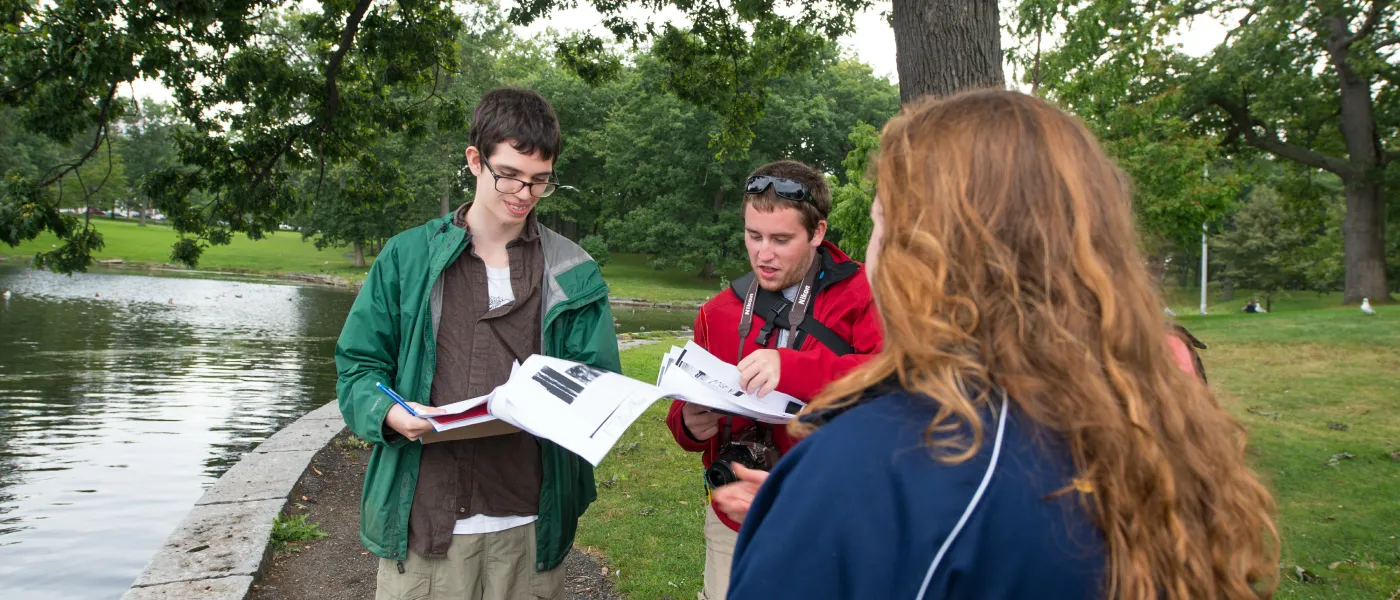
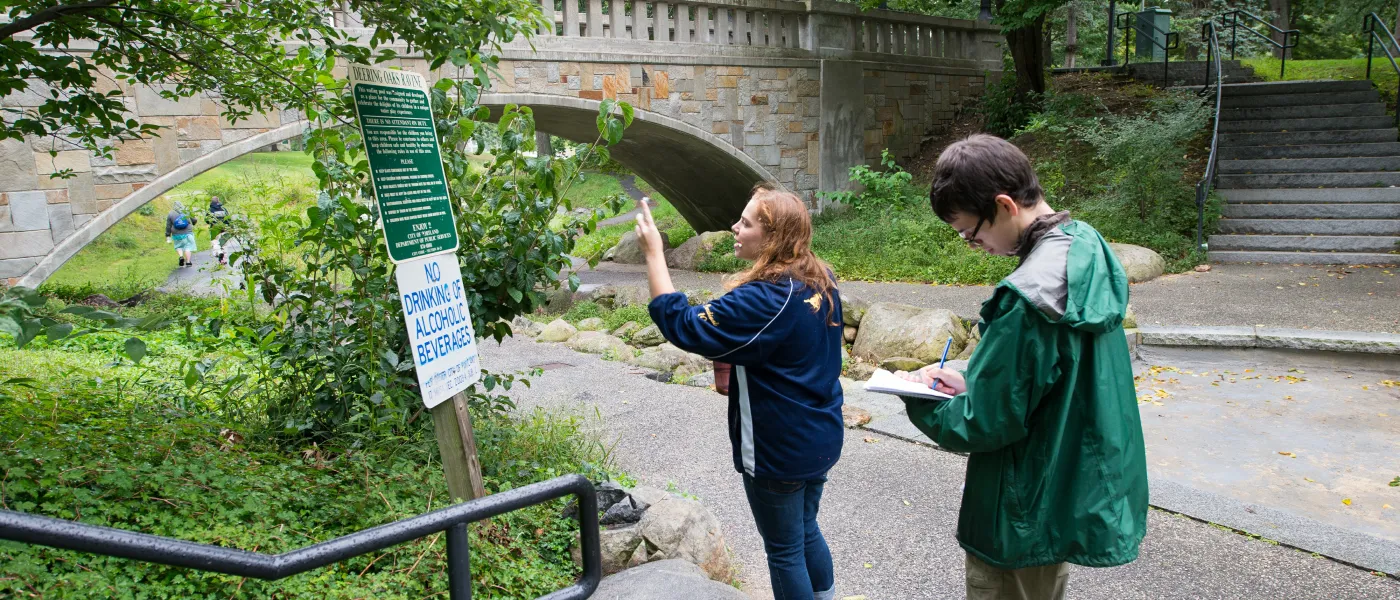
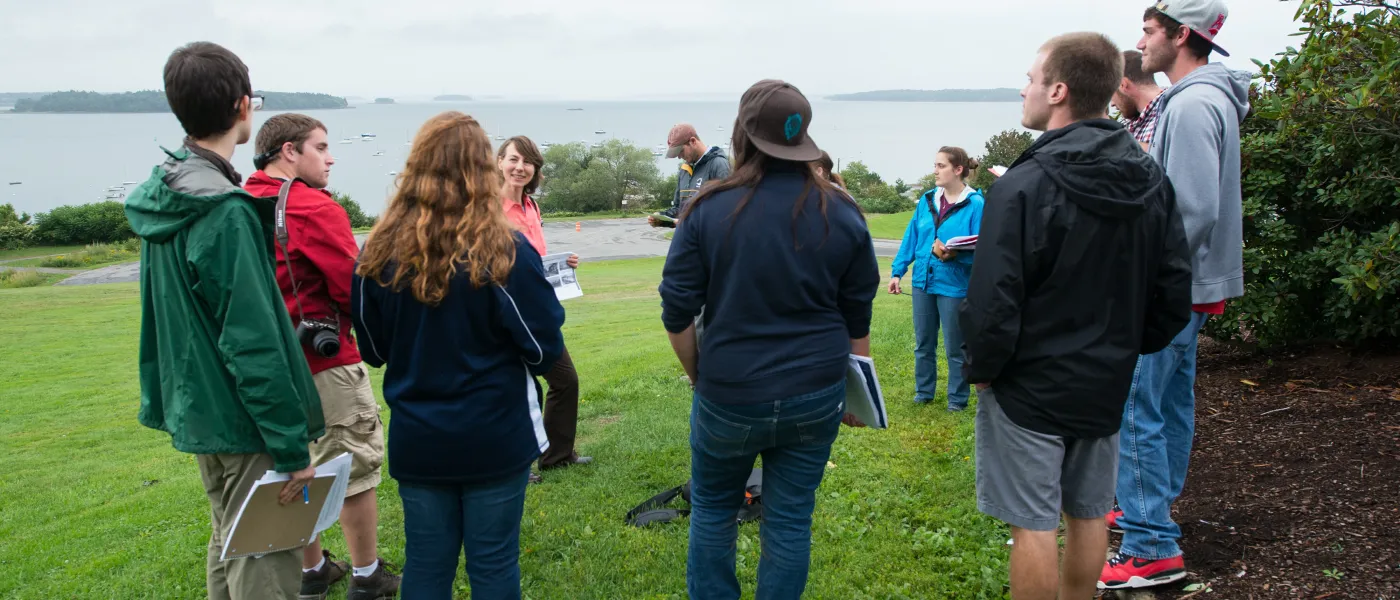
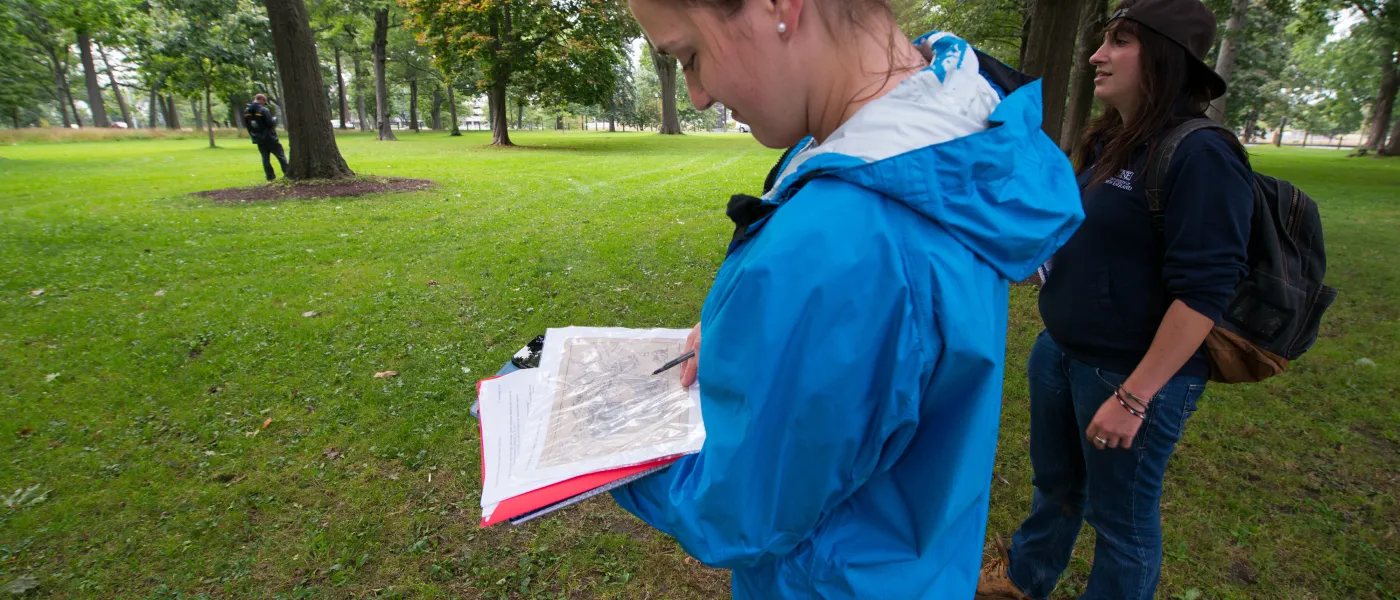
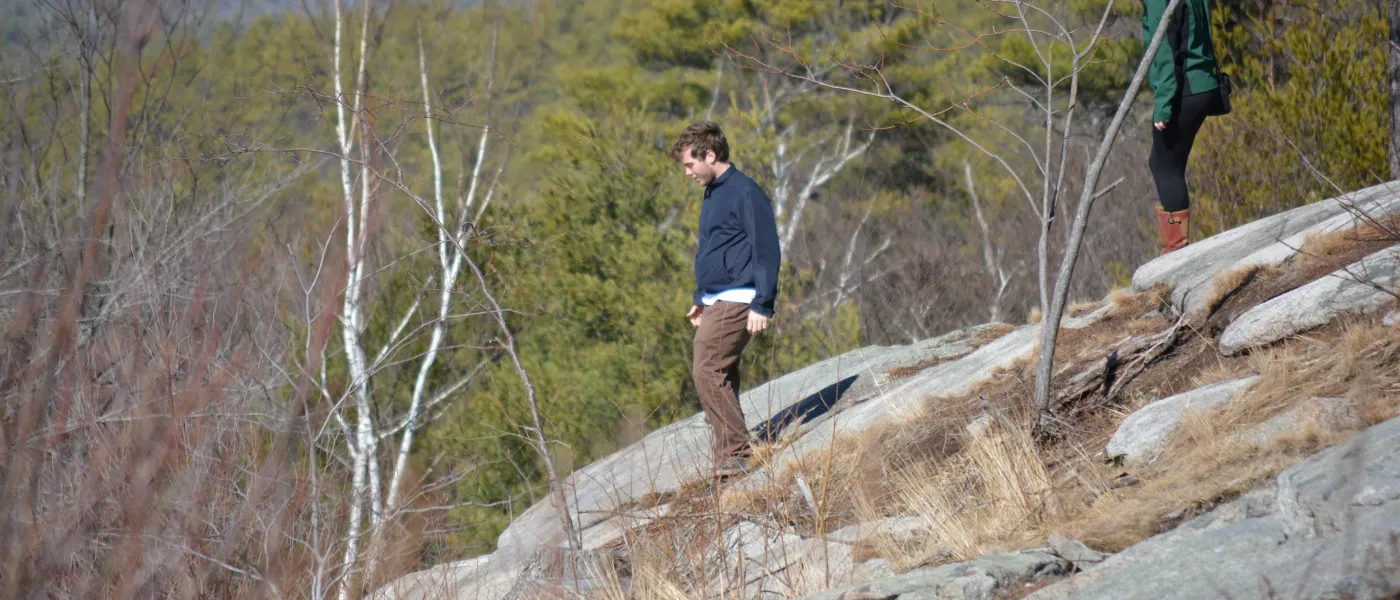
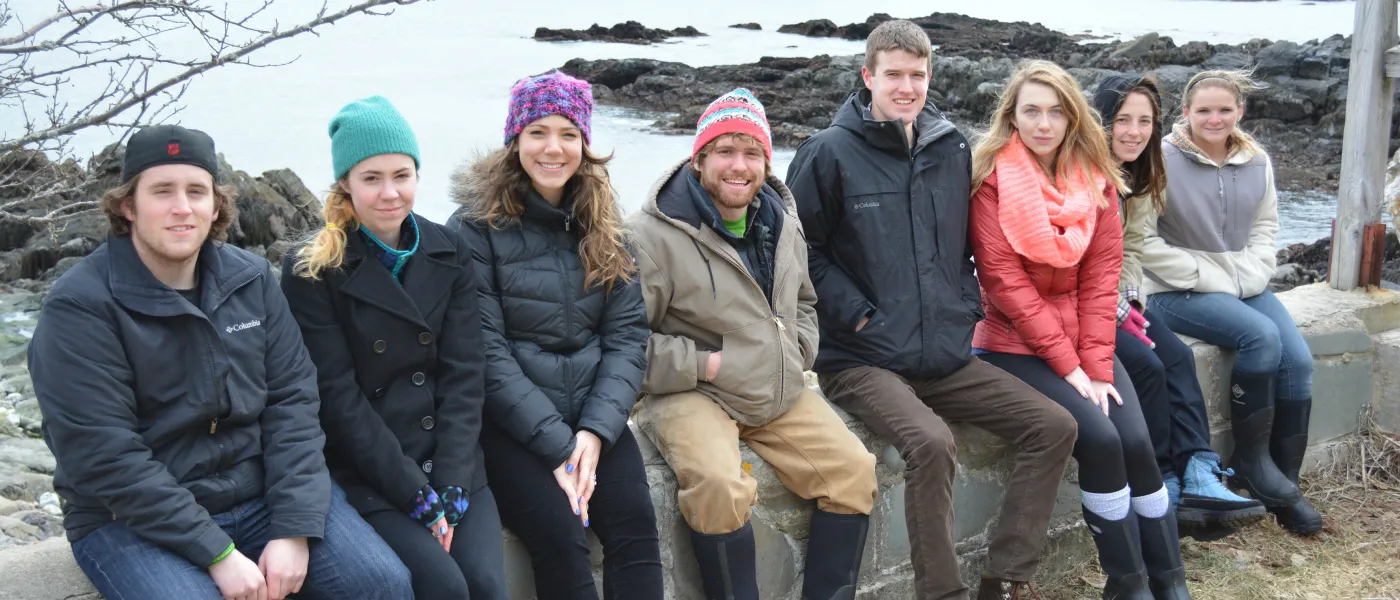
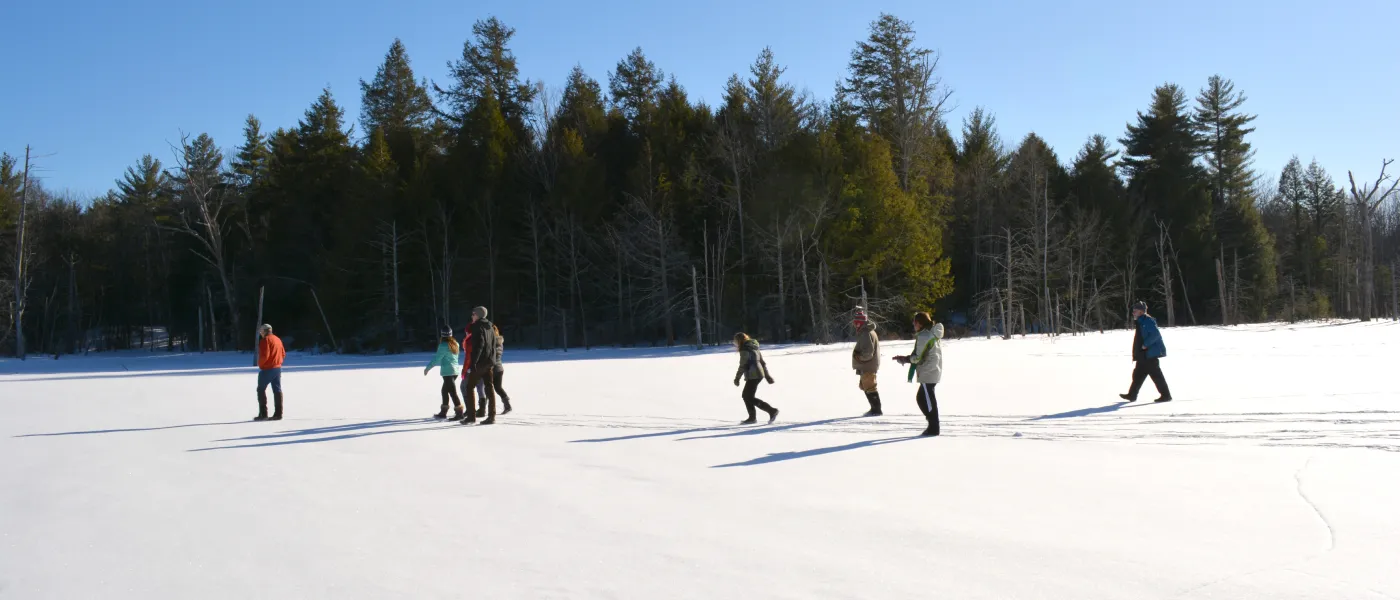
Apply Today
Ready to begin your future in UNE’s B.S. in Environmental Studies?
Bachelor of Science in Environmental Studies FAQ
What is environmental studies?
Environmental studies is a broad and interdisciplinary field that explores the complex relationships between humans and the environment. It delves into the science, policy, and social dimensions of environmental issues, equipping individuals with the knowledge and skills to analyze problems, develop solutions, and promote sustainability.
At the University of New England, we take environmental studies very seriously. UNE is deeply committed to sustainability, and we're recognized by The Princeton Review in its Guide to Green Colleges.
What is an environmental studies major?
An environmental studies major is a flexible and interdisciplinary academic program that equips you with the knowledge and skills to understand and address the pressing environmental challenges facing our planet. It's not just about learning about nature; it's about understanding the complex interactions between humans, society, and the environment.
You will study:
- Natural sciences such as biology, chemistry, physics, and ecology provide a foundation for understanding the physical and biological processes that govern the environment.
- Social sciences courses in economics, sociology, anthropology, and political science so you can explore the social, cultural, and political dimensions of environmental issues.
- Humanities courses in philosophy, history, and literature that will help you develop critical thinking skills and examine the ethical considerations surrounding environmental decision-making.
- Policy and law so you will gain an understanding of the legal and regulatory frameworks that shape environmental protection efforts.
As an Environmental Studies major at UNE in Biddeford, Maine, you will explore the ocean, river, woodlands, wetlands, and vernal pools, as well as beach and dune habitats. Your opportunities for environmental studies research and field work on campus are nearly limitless in our 540-acre natural wonderland on the coast of Maine.
What can you do with an environmental studies degree?
Environmental studies graduates can pursue diverse careers in various sectors, including:
- Government agencies and NGOs: Working on environmental policy, regulation, and conservation initiatives.
- Research and academia: Conducting research, teaching, and contributing to scientific knowledge on environmental issues.
- Private sector: Working in sustainability consulting, environmental engineering, renewable energy, and eco-friendly businesses.
- Education and outreach: Educating the public about environmental issues and promoting sustainable practices.
- Law and advocacy: Working on environmental law, policy reform, and advocating for environmental rights.
Through UNE’s B.S. in Environmental Studies degree program in Maine, our graduates have pursued careers in many fascinating fields, including:
- Environmental Advocacy
- Air and Water Resource Management
- Ecological Restoration
- Habitat Conservation
- Environmental Impact Assessment
- Toxicology
- Field Research
- Environmental Law and Regulation
Why is environmental studies important?
Environmental studies is crucial for several reasons, encompassing the physical, social, and ethical dimensions of our relationship with the planet.
Environmental studies plays a vital role in protecting the planet, promoting a healthy and sustainable future, empowering individuals to become responsible stewards of the environment, and shaping policies that will prioritize environmental protection and sustainable development.
At UNE, our environmental faculty and professional staff work hard to create an enriched curriculum and learning experience about the importance of environmental studies for all majors, minors, and environmental elective class prospects.
Meet faculty and professional staff in UNE's School of Marine and Environmental Programs
What is the best environmental studies degree program for me?
Below are a few factors that you should look for when searching for an environmental studies degree program.
Faculty
Figure out your preferences for an environmental studies instructor and dive into their academic and professional background. Also consider reviewing faculty research to determine the best fit for your educational journey.\
At UNE, the faculty of the College of Arts and Sciences has defined environmental awareness as a major theme in the College's Core Curriculum. The UNE College of Arts and Sciences is one of the few in the nation that requires formal instruction in Environmental Studies as a requirement for graduation.
As an environmental studies major at UNE, you will learn from and have the opportunity to conduct research alongside our esteemed faculty and professional staff.
Meet faculty and professional staff in UNE's School of Marine and Environmental Programs
Curriculum
Review the environmental studies degree program curriculum to see if it seems like a good fit for you and includes a hands-on approach to your undergraduate career.
At UNE, there are many ways you can navigate the B.S. in Environmental Studies degree program.
The following are just some examples of the exciting courses that UNE’s Environmental Studies major offers:
- Sustainability and Ecological Restoration
- Environmental Communication: Expert Practices for Ecosystem Management
- Contemporary Nature Writing
- Environmental Movements and Social Change
- Environment, Health, and Community Development in East Africa
- Climate Change Adaptation: Planning and Policy
The Green Learning Community (GLC) is an intentional community of UNE professors and first-year students dedicated to studying human relations to the environment. The year-long experience integrates courses in biology, environmental issues, literature, and economics.
Learn more about UNE’s B.S. in Environmental Science curriculum
Career Goals
Determine if the program offers career advising and qualifies you for a successful, worthwhile career in the environmental field.
UNE’s Bachelor of Science in Environmental Studies sets you up with the critical thinking skills needed to have a successful environmental studies career. Through degree program coursework, research, and life skills you acquire from internships and close working relationships with faculty and peers, you will be well on your way to an exciting career working in environmental programs.
UNE B.S. in Environmental Studies graduates have pursued careers in many fascinating fields, including:
- Environmental Advocacy
- Air and Water Resource Management
- Ecological Restoration
- Education
- Habitat Conservation
- Park Management
- Environmental Impact Assessment
- Toxicology
- Field Research
- Environmental Law and Regulation
UNE Students can benefit from the support of the Academic and Career Advising Center, whether they have a clear career goal or a general interest in a particular field.
Learn more about Career Advising at UNE
Learning Environment
Ask yourself what kind of environment suits you best. Figure out if you want to stay in your state or if you wish to move. See if you will be inspired or challenged by your fellow students and faculty.
At UNE, nature will be your classroom as you earn your Bachelor of Science in Environmental Studies and acquire the professional skills needed to make a real difference for the environment.
Within a short walk or drive from UNE's Biddeford Campus, you may explore a variety of unique habitats, including our campus coastline and the University's 363 acres of contiguous forest.
Learn more about UNE’s campuses and how you can visit us
UNE’s coastal Maine campus is also your stepping stone to some of Northern New England’s most intriguing ecosystems. Whether you visit one of our neighboring beaches, preserves, or wildlife parks, or you take a weekend trip to Acadia National Park or the White Mountains, you will always find something in nature to learn about or explore.
We also encourage environmental studies students to study abroad and learn about environmental ecosystems and initiatives in other geographic areas. UNE's Global Education program offers semester-long study abroad options in Spain, France, Iceland, or our Morocco campus. You can also select shorter travel courses to places such as Ireland, Mexico, Kenya, Italy, Cuba, and more.
Learn more about study abroad opportunities at UNE
Financial Aid
Consider whether the school you're interested in provides financial aid or scholarships to support your education.
A UNE undergraduate education is affordable. Our tuition is 16% below the average tuition for private universities in New England. Plus, all incoming full-time undergraduate students at UNE will receive Merit Scholarships in amounts from $5,000 to $22,000 per year.
Learn more about grants and scholarships available to students at UNE

